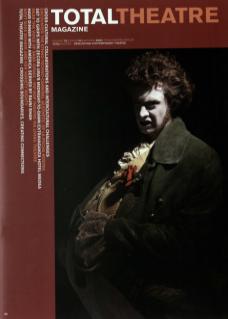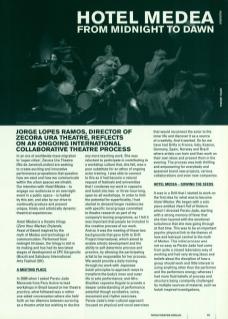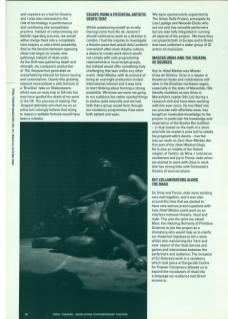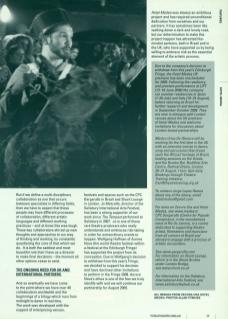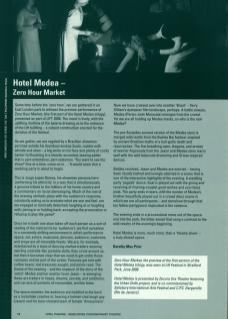In an era of worldwide mass migration to 'super-cities', Zecora Ura Theatre (Rio de Janeiro / London) are seeking to create exciting and innovative performance propositions that question how we exist and how we communicate within the urban spaces we inhabit. Our intention with Hotel Medea – to engage our audiences in an overnight event in a public space is fuelled by this aim, and also by our drive to continually produce and present unique, timely and artistically dynamic theatrical experiences.
Hotel Medea is a theatre trilogy (Zero Hour Market, Drylands, Feast of Dawn) inspired by the myth of Medea and technology of communication. Performed from midnight till dawn, the trilogy is still in its making and has had its two latest stages of development at CPC Gargarullo (Brazil) and Salisbury International Arts Festival (UK).
A Meeting Place
In 2006 when I asked Persis-Jade Maravala from Para Active to lead workshops in Brazil based on her theatre practice, what followed was a rather one-sided conversation where she held forth on her dilemma between surviving as a theatre artist but wishing to decline any more teaching work. She was reluctant to participate in contributing to a workshop culture that, she felt, was a poor substitute for an ethos of ongoing actor training. I was able to connect to this as it had become a natural request of festivals and universities that I condense my work in capoeira and butoh into two or three-hour-long, open-to-all workshops. In order to limit the potential for superficiality, I had started to demand longer residencies with specific local groups committed to theatre research as part of my company's touring programme, as I felt it was important that people be included in the creative process of our work. And so it was the meeting of these two backgrounds that gave birth to Drift Project International, which aimed to enable artistic development and the ability to self-determine process and practice, by allowing the participating artist to be responsible for her process. We would provide a daily training through my work with Japanese butoh principles to approach ways to transform the body's inner and outer life in solo performance; and Afro-Brazilian capoeira Angola to provide a deeper understanding of performance potential though acrobatics, voice, movement and rhythm exercises. Persis-Jade's inter-cultural approach focused on physical and vocal exercises that would reconnect the actor to the inner life and discover it as a source of creativity. And it worked. So far we have had Drifts in France, Italy, Kosovo, Germany, Spain, Norway and Brazil where artists can train and then work on their own ideas and present them in the evening. The process was both thrilling and empowering for everybody and spawned brand new projects, various collaborations and even new companies.
Hotel Medea – Sowing the Seeds
It was in a Drift that I started to work on the first idea for what was to become Hotel Medea. We began with a solo piece entitled Heart Full of Holes in which I directed Persis-Jade, starting with a strong memory of fever that she then layered with the emotional turbulence that she was going through at that time. This was to be an important psycho-physical link to the themes of love and betrayal central to the myth of Medea. This initial process was not so easy as Persis-Jade had come from quite a closed laboratory way of working and had very strong ideas and beliefs about the discipline of how a group should work and little interest in using anything other than the performer and the performers energy; whereas I had more fluid beliefs of process and structure being constantly challenged by multiple sources of material, such as butoh inspired investigations, and capoeira as a tool for theatre; and I was also interested in the role of technology in performance and continuing site-sympathetic practice.
Instead of compromising our beliefs regarding process, we would either merge them into a completely new enquiry or add a third possibility. And so the tension between opposing ideas had begun to create new pathways instead of dead-ends. As the Drift was gathering depth and strength, my company's production of The Tempest had generated an overwhelming interest for future touring and commissions. Clearly this growing interest necessitated a safe formula of a 'Brazilian' take on Shakespeare, which was an easy trap to fall into but may have spelled the death of my work in the UK. The process of making The Tempest definitely enriched me as an artist but I strongly believe that trying to repeat a sellable formula would have been a mistake.
Escape from a Potential Artistic Death-Trap
Whilst questioning myself as to why (having come from Rio de Janeiro) I should continue to work as a director in London, I had the impulse to investigate a theatre piece that would defy London's convenient after-work theatre culture; a desire to create work which would not comply with safe programming requirements or local target groups, but instead would offer something truly challenging that was unlike any other event. Hotel Medea, with its premise of being an overnight production invited international interest and it was time to start thinking about forming a strong ensemble. We knew we were not going to run auditions but rather wanted things to evolve quite naturally and we had faith that a group would form through our residency programmes if we were both patient and open.
We were spectacularly supported by The Urban Dolls Project, principally by Lisa Lapidge and Nwando Ebizie who are not only fine versatile performers but are also fully integrated in running all aspects of the project. We have thus run projects both in Europe and in Brazil that have collected a wider group of 23 actors and musicians.
Master Urias and the Theatre of Sources
Key to Hotel Medea was Master Urias de Oliveira. Urias is a master in theatrical rituals and celebrations still alive in the Brazilian northeast region, especially in the state of Maranhão. We literally stumbled across Urias in Maranhão's capital São Luiz during a research visit and have been working with him ever since. He has fitted into our process with effortless ease, has bought an invaluable knowledge to the project. In particular his knowledge and experience of the Bumba Boi tradition – a ritual based on the myth of a slave who kills his master's prize bull to satisfy his pregnant wife's desire – has fed into our work on Zero Hour Market, the first part of the Hotel Medea trilogy. He is also an initiate of the Vodum religion of Tambor de Mina. I noticed an excitement and joy in Persis-Jade when we started to work with Urias in work that has strong links with Grotowski's theatre of sources phase.
Key Collaborators Along the Road
So Urias and Persis-Jade were working very well together, and it was also around this time that we started to have very serious preoccupations with how Hotel Medea could work as an interface between theatre, ritual and myth. This was the point we asked Marc Von Henning (formerly of Primitive Science) to join the project as a dramaturg who would help us to clarify our theatrical impulses to tell a story whilst also maintaining the 'here and now' aspect of the ritual dances and games and interactions between the performers and audience. The inclusion of DJ Dolores' work in a residency which took place at Gargarullo Centre for Popular Conspiracy allowed us to expand the vocabulary of ritual into a language our audience had direct access to.
But if we define a multi-disciplinary collaboration as one that occurs between specialists in differing fields then we have to expect that these people may have different processes of collaboration, different artistic languages and different working practices – and at times this was tough. These key collaborators stirred up new thoughts and approaches to our way of thinking and working, by constantly questioning the core of that which we do. It is both the saddest and most beautiful role that I have as a director to make final decisions – the moment all other options cease to exist.
The Ongoing Need for UK and International Partners
And so eventually we have come to the point where we have over 40 collaborators worldwide and the beginnings of a trilogy which runs from midnight to dawn in real time. The work was developed with the support of enterprising venues, festivals and spaces such as the CPC Gargarullo in Brazil and Shunt Lounge in London. Jo Metcalfe, director of the Salisbury International Arts Festival, has been a strong supporter of our work since The Tempest performed at Salisbury in 2007. Jo is one of those rare theatre producers who really understands and embraces risk-taking in order for extraordinary events to happen. Wolfgang Hoffman of Aurora Nova (the world theatre festival-within-a-festival at the Edinburgh Fringe) has supported the project from its conception.
Due to Wolfgang's decision to withdraw from this year's Fringe, we decided to support his decision and have declined other invitations to perform in the Fringe 2008. Aurora Nova's ethos is one of the few we truly identify with and we will continue our partnership for August 2009.
Hotel Medea was always an ambitious project and has required unconditional dedication from ourselves and our partners. It has sometimes been like walking down a dark and lonely road, but our determination to make this project happen has attracted like-minded partners, both in Brazil and in the UK, who have supported us by being willing to embrace risk as the essential element of the artistic process.
Hotel Medea – Zero Hour Market
Some time before the 'zero hour', we are gathered in an East London park to witness the preview performance of Zero Hour Market, (the first part of the Hotel Medea trilogy), presented as part of LIFT 2008. The mood is lively, with the uplifting rhythms of the bateria drawing us to the entrance of the Lift building – a cuboid construction erected for the duration of the festival.
As we gather, we are regaled by a Brazilian showman perched astride his (bamboo) donkey Susie, replete with whistle and siren – a big smile on his face and plenty of cocky banter forthcoming in a heavily-accented, teasing patter that is part entertainer, part-salesman. 'You want to see the show? One at a time, come on in...' It would seem that a wedding party is about to begin.
This is Jorge Lopes Ramos, his showman persona here ‘performing’ his ethnicity in a way that is simultaneously a genuine tribute to the folklore of his home country and a commentary on racial stereotyping. Much of the rest of the evening similarly plays with the audience's response, constantly asking us to evaluate what we see and feel: are we engaged or ironically detached; laughing at or laughing with; joining in or holding back; accepting the provocation or refusing to play the game?
Once let in (with one shoe taken off each person as a sort of sealing of the contract to be 'audience'), we find ourselves in a constantly shifting environment in which performance space, set, actors, musicians, dancers, audience, costumes, and props are all moveable feasts. We are, for example, entertained by a team of dancing market-traders wearing swirling umbrella-like portable stalls; they circle around us, but then it becomes clear that we need to get under those canopies and be part of the action. Fortunes get told with coffee beans, lost treasures sought, and palms read. The theme of the evening – and the essence of the story of the ‘Witch' Medea and her warrior lover Jason – is emerging: these are traders in hopes, dreams, secrets, and ambitions, and carriers of portents of irreversible, terrible fates.
The space mutates: the audience are huddled to the back as a motorbike crashes in, bearing a helmet-clad tough guy (Jason) and his bare-chested team of female 'Amazonians'.
Now we have crossed over into another 'Brazil’ – Terry Gilliam's dystopian film landscape, perhaps. A battle ensues; Medea (Persis-Jade Maravala) emerges from the crowd. Yet we are all holding up Medea masks, so who is the real Medea?
The pre-Euripides ancient version of the Medea story is merged with motifs from the Bumba Boi festival, inspired by ancient Brazilian myths of a bull-god's death and resurrection. The fire-breathing oxen, dragons, and armies of warrior Argonauts from the Jason and Medea story marry well with the wild batacuda drumming and Orixas-inspired dances.
Battles resolved, Jason and Medea are married – having been ritually bathed and lovingly adorned in a scene that is one of the interactive highlights of the evening. A wedding party 'pagoda' dance ritual is played out with the giving and receiving of rhyming-couplet good wishes and scurrilous jests. The party ends in tears, with the murder of Medea's brother beautifully played out in a crowd disco scene in which we are all participants – and somehow through that (as fellow-party-goers) implicated in the violence.
The evening ends in a processional move out of the space and into the park, the bitter-sweet final song a contrast to the wild revelry of the evening's beginning.
Hotel Medea is more, much more than a 'theatre show’ – a truly shared space.
Dorothy Max Prior
